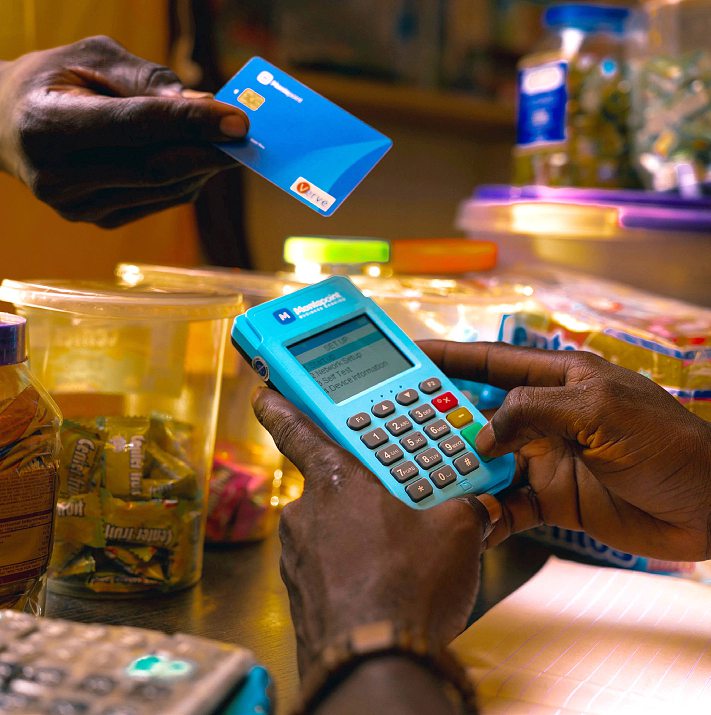Unicorns made in Nigeria
Payment solutions for financial institutions, consumer services... Fintechs are booming. And some are already valued at over a billion dollars.

Standing at the foot of the pedestrian bridge that crosses the three-lane motorway linking the northern part of Abuja with its inner suburbs, Salatu Ibrahim juggles between the two blue Moniepoint terminals on her small wooden table. Her customers are always in a hurry and want their cash withdrawal or money transfer to be validated on the screen of one of the debit card machines she uses to build customer loyalty. “A little over a year ago, there were only three of us doing financial transactions in this area,” says Salatu. “Now I have plenty of competitors. My neighbour opposite works with OPay's electronic terminal. Someone else, five metres away, uses Moniepoint like me, but also has a purple PalmPay terminal.”
In Nigeria, these brightly coloured app-connected POS terminals have taken over the financial transactions market for individuals and businesses in under ten years. Payments are instant and verifiable on any screen, with an average failure rate lower than that of traditional bank transfers. Above all, they are accessible, so you can open an account by phone, and rapidly get a credit card. While the Central Bank of Nigeria (CBN) regularly criticises individual operators in this competitive and imaginative sector, it also recognises the key role played by these young digital companies during the Covid-19 crisis, of course, and especially during the late 2022 early 2023 crisis, when there were not enough new banknotes in circulation to satisfy demand.
But while Nigerian fintechs have revolutionised banking practices in the country and on the continent over the last fifteen years, they have also brought an entire, usually invisible sphere – the informal sector – back into the system. Representing 37% and 20% of the market in terms of financial transactions generated, Nigerian companies OPay and Moniepoint are the POS (point of sale) leaders in terms of withdrawals, deposits and transfers. PayCom was founded in Lagos by Chinese entrepreneur Zhou Yahui, with backing from SoftBank Vision Fund and Sequoia Capital China. Under the name PayCom Nigeria, OPay is fast becoming the most downloaded fintech app in the country. Its secret: combining multiple services. By diversifying with OFood, ORide, OCar, OBus and OKash, OPay is laying the foundations for its exponential growth.
Start-up OPay is still smiling despite the safety related ban on the okada unmarked motorbike taxis in Lagos State, which put an end to its ORide service. Because, regardless of that setback, its money and mobile payment services continue to flourish. It was granted a banking licence by the CBN. Its strategy is working: its multiservice app draws customers to a single platform, offering a payment solution to unbanked or underbanked users, who can send and receive money easily, and pay bills via a vast network of agents. OPay currently boasts 35 million individual customers. By focusing its development strategy on the informal sector, Moniepoint is following a similar path to that of its rival OPay. However, it has taken a very different path. “No other financial technology company has spent four years like us understanding how the banking sector works in practice, and not just in theory,” says Edidiong Uwemakpan, vice-president of Moniepoint. “And when we decided to launch, we were better prepared than anyone else.” The Moniepoint adventure began under the name TeamApt in 2015. At its helm were six developers based in Lagos, under the leadership of Tosin Eniolorunda and Felix Ike, both from Interswitch, the first African unicorn launched in 2002. The duo contributed to the creation of a digital system for the interconnection of Nigerian banks. TeamApt was joined by four other developers. By combining the experience of each, the start-up came up with two products: the Moniepoint payment terminal and Monify virtual accounts. This combination was revolutionary in 2018, when most Nigerian banks were still validating the majority of their transactions manually. TeamApt became Moniepoint in January 2023. “We operate under a microfinance banking licence, with the flexibility and agility of a digital bank,” says a smiling Edidiong Uwemakpan. “We're striving to attain the level of credibility enjoyed by traditional banks.” Millions of SMEs, particularly from the informal economy, but also large companies, signed up on the platforms offered by Moniepoint, attracted by the possibilities of loans. By 2024, the start-up was as healthy as a major corporation. It reported a monthly transaction volume of 800 million. And, again according to Moniepoint, 17 billion dollars a month were passing through its machines, spread across every corner of the country.
There are two other fintechs vying for third place on Nigeria's digital payment services podium: PalmPay and Kuda Bank, who are neck and neck to become the next unicorn. But they're still a way behind Flutterwave, co-founded and run by Olugbenga Agboola. Valued at an estimated 3 billion dollars in 2024, this fintech start-up that has now become a multinational continues to attract investors. It works alongside and trades with giants such as Visa and Mastercard. Using an API (Application Programming Interface), Flutterwave is able to process any type of payment. With no incompatibility between systems or financial services. Tested and validated first by merchants in Africa, then by those in emerging markets, this online payment solution is said to count Facebook, Uber and Jumia among its customers. And while Flutterwave is headquartered in San Francisco, USA, its heart still beats from its offices in Lagos. In Nigeria.